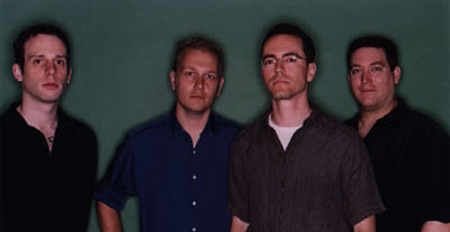
The huge stillness of a nearly empty music hall. The instruments are alone on stage, waiting to be played. The emptiness illuminated by the bluish-white overhead lights is miserable. There are cracks and malformations in the floorboards I’ve never seen. There is barely a soul in the place, two hours after the doors have opened. A lone soul moves from the crowd to the stage, hat turned backward with hair spilling down his back. He leans to examine the equipment on stage that has been used over and over before, but not yet tonight. And the ears and eyes of the cliques are still hungry.
How would I describe the rampant stillness? Riveting. Stellar. Fucking brilliant.
And then one guy comes on stage -- perhaps an opener who hadn’t been listed on the program? Perhaps a member of the tech crew running through some last-minute checks? No, he is the representative of the solo/four-member band, The Zincs, Jim Elkington. Cue the incessant hooting -- the “hey-ing,” the “yeah-ing.” Starting first as a subdued and random burst, a withdrawn alcoholic obligation, it eventually transforms into an increasingly hideous monster. With every laugh, with every “SHUSH” (and there are many), it becomes increasingly powerful.
But I digress.
Elkington’s resounding voice echoes against the arcs, flooding the empty floor where the movement of sound has nothing, nobody to block its path. His fingers are in constant movement as they pluck the strings to the accompaniment of an invisible band that lives in the speakers. “I’m representing the Zincs tonight,” he says between songs, as his mouth bounces up and down, chewing the gum that remains in his mouth throughout the entire show. “There’s usually a bunch of us.”
At one point, Elkington leans beyond the lights and sways back and forth, looking to the back of the room where the entirety of his listeners are seated at tables with drinks in their hands. And it never changes. There’s not one person on the floor during the entire time that he’s playing. Not one.
Toward the end of his set, he invites Sea and Cake guitarist Archer Prewitt to play on a song. They both look rather awkward (as I think it might have simply been a spontaneous invitation to Prewitt, who had been standing in the wings), playing together with the timidity of strangers. After the set, Elkington leaves and people finally come to the floor. Twee as fuck, everyone slowly gathers around the stage.
Although he played well, Elkington effectively killed the life of the music hall. And so, even as The Sea and Cake took the stage, bathed appropriately in a seafoam green light, there were only a few yells from the splintered crowd and the drunken calls of The Jackass. There was no movement from the stage or the crowd, as the first notes of “Up on Crutches” calmly tumbled from the towers of speakers. There was the swaying of bassist Eric Claridge and one or two bobbing heads reflecting contradicting opinions of the beat, and that was about it.
It wasn’t so much a concert as it was a middle school diorama: flat figures stuck with glue, with only the illusion of movement. As such, there was a lack of any sort of acknowledgment of the crowd by the band during the first several songs. But it suited the distant mood between the musicians and their listeners. And then, finally, “Mr. F” took the first steps to break through the ice. Then there was movement, then there was excitement. Thankfully, it was a very comfortable show from that point onward -- easy to slip into, an easy fit.
The Sea and Cake made it amply clear that they are veteran musicians. Even with the similar structure and sound of so many of the band’s songs, there were few noticeable signs of communication on stage. Claridge’s intent eyes and beard would every now and again meet the glance of John McEntire as he brutalized the drum set. Prewitt swayed and buoyed with eyes closed for the extended “Exact to Me,” which subsequently stirred and drove the crowd. All considered, it wasn’t the most exciting show, and the initial boredom probably killed two to three people, but that’s all right. It all somehow suited the night perfectly.